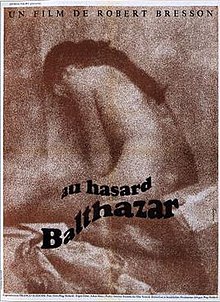Au Hasard Balthazar
| Au Hasard Balthazar | |
|---|---|

French poster
|
|
| Directed by | Robert Bresson |
| Produced by | Mag Bodard |
| Written by | Robert Bresson |
| Starring |
Anne Wiazemsky François Lafarge |
| Music by | Jean Wiener |
| Cinematography | Ghislain Cloquet |
| Edited by | Raymond Lamy |
| Distributed by | Cinema Ventures |
|
Release date
|
|
|
Running time
|
95 minutes |
| Country | France Sweden |
| Language | French |
| Box office | $45,406 (2003 re-release) |
Au hasard Balthazar (French pronunciation: [o a.zaʁ bal.ta.zaʁ]; meaning "Balthazar, at Random"), also known as Balthazar, is a 1966 French film directed by Robert Bresson. It was succinctly characterized by J. Hoberman in 2003: "Robert Bresson's heart-breaking and magnificent Au Hasard Balthazar (1966) — the story of a donkey's life and death in rural France — is the supreme masterpiece by one of the greatest of 20th-century filmmakers."
The film follows Marie (Wiazemsky), a shy farm girl, and her beloved donkey Balthazar over many years. As Marie grows up, the pair becomes separated, but the film traces both their fates as they live parallel lives, continually taking abuse of all forms from the people they encounter. The donkey has several owners, most of whom exploit him, often with more cruelty than kindness. Balthazar and Marie often suffer at the hands of the same people. But in the end, Marie's fate remains unresolved, whereas the donkey's is clear.
After making several prison-themed films using his theory of "pure cinematography", Bresson stated that he wanted to move onto a different style of filmmaking. The story was inspired by Fyodor Dostoyevsky's The Idiot and each episode in Balthazar's life represents one of the seven deadly sins. Bresson later stated that the film was "made up of many lines that intersect one another" and that Balthazar was meant to be a symbol of Christian faith. Bresson produced the film with help from the Swedish Film Institute.
According to Wiazemsky's 2007 novel Jeune Fille, she and Bresson developed a close relationship during the shooting of the film, although it was not consummated. On location they stayed in adjoining rooms and Wiazemsky says "at first, he would content himself by holding my arm, or stroking my cheek. But then came the disagreeable moment when he would try to kiss me ... I would push him away and he wouldn't insist, but he looked so unhappy that I always felt guilty." Later Wiazemsky lost her virginity to a member of the film's crew, which she says gave her the courage to reject Bresson as a lover. Bresson was known to cast nonprofessional actors and use their inexperience to create a specific type of realism in his films. Wiazemsky states: "It was not his intention to teach me how to be an actress. Almost against the grain, I felt the emotion the role provoked in me, and later, in other films, I learned how to use that emotion."
...
Wikipedia
